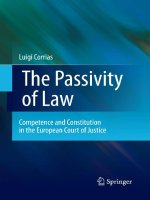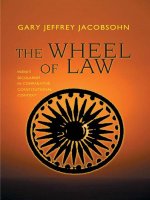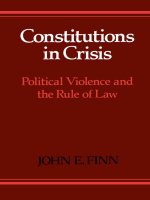The european comminuties and the rule of law
Bạn đang xem bản rút gọn của tài liệu. Xem và tải ngay bản đầy đủ của tài liệu tại đây (6.23 MB, 154 trang )
THE HAMLYN LECTURES
Twenty-ninth Series
THE EUROPEAN
COMMUNITIES AND
THE RULE OF LAW
Lord Mackenzie Stuart
STEVENS
THE EUROPEAN
COMMUNITIES AND
THE RULE OF LAW
by
LORD MACKENZIE STUART
Judge of the Court of Justice of
the European Communities
In 1962 in their judgment on the historic case
of Van Gend en Loos the Court of Justice of
the European Communities declared that:
" The Community constitutes a new legal order
. . . for the benefit of which the [Member]
States have limited their Sovereign rights."
In the 1977 Hamlyn Lectures, Lord Mackenzie
Stuart, a Judge of the Court of Justice of the
European Communities, examines this concept
and seeks to trace its origin and to analyse its
nature and its novelty. In particular he discusses
the part played by the European Court in
sustaining that "legal order" and the extent
to which characteristics of the judicial function
common to the six original Member States have
determined the approach of the Court.
At this time, when the United Kingdom is still
adjusting to the implications of joining the
European Communities, and United Kingdom
law is being increasingly influenced by the
jurisprudence of the other Member countries,
this series of lectures is particularly significant
and important. Students of law, politics and
government, as well as lawyers, businessmen,
and all those interested in the effect of EEC
law, will welcome this authoritative work.
Published under the auspices of
THE HAMLYN TRUST
1977
£4.90 net
Also available in paperback
THE HAMLYN LECTURES
TWENTY-NINTH SERIES
THE EUROPEAN COMMUNITIES
AND
THE RULE OF LAW
AUSTRALIA
The Law Book Company Ltd.
Sydney : Melbourne : Brisbane
CANADA AND U.S.A.
The Carswell Company Ltd.
Agincourt, Ontario
INDIA
N. M. Tripathi Private Ltd.
Bombay
ISRAEL
Steimatzky's Agency Ltd.
Jerusalem : Tel Aviv : Haifa
MALAYSIA : SINGAPORE : BRUNEI
Malayan Law Journal (Pte) Ltd.
Singapore
NEW ZEALAND
Sweet & Maxwell (N.Z.) Ltd.
Wellington
PAKISTAN
Pakistan Law House
Karachi
THE
EUROPEAN COMMUNITIES
AND
THE RULE OF LAW
BY
LORD MACKENZIE STUART
Judge of the Court of Justice of the European Communities
Published under the auspices of
THE HAMLYN TRUST
LONDON
STEVENS & SONS
1977
Published in 1977
by Stevens & Sons Limited
of 11 New Fetter Lane, London
and printed in Great Britain by
The Eastern Press Limited
of London and Reading
ISBN Hardback 0 420 45190 0
Paperback 0 420 45200 1
Lord Mackenzie Stuart
1977
CONTENTS
The Hamlyn Lectures
The Hamlyn
Trust
vii
.
.
.
.
.
.
.
i x
Preface
1. T H E C O M M U N I T Y R U L E O F L A W
xi
.
.
.
.
1
2. T H E C O U R T O F J U S T I C E A N D T H E J U D I C I A L P R O C E S S .
3. J U S T I C I A B L E I S S U E S I N C O M M U N I T Y L A W .
4. " P O L I T I C S , P H I L O S O P H Y A N D E C O N O M I C S "
5. F U T U R E T R E N D S
.
.
.
29
59
.
81
104
THE HAMLYN LECTURES
1949 Freedom under the Law
by The Rt. Hon. Lord Denning
1950 The Inheritance of the Common Law
by Richard O'Sullivan, Esq.
1951 The Rational Strength of English Law
by Professor F. H. Lawson
1952 English Law and the Moral Law
by Dr. A. L. Goodhart
1953 The Queen's Peace
by Sir Carleton Kemp Allen
1954 Executive Discretion and Judicial Control
by Professor C. J. Hamson
1955 The Proof of Guilt
by Dr. Glanville Williams
1956 Trial by Jury
by The Rt. Hon. Lord Devlin
1957 Protection from Power under English Law
by The Rt. Hon. Lord MacDermott
1958 The Sanctity of Contracts in English Law
by Sir David Hughes Parry
1959 Judge and Jurist in the Reign of Victoria
by C. H. S. Fifoot, Esq.
1960 The Common Law in India
by M. C. Setalvad, Esq.
1961 British Justice: The Scottish Contribution
by Professor T. B. Smith
1962 Lawyer and Litigant in England
by The Hon. Mr. Justice Megarry
1963 Crime and the Criminal Law
by The Baroness Wootton of Abinger
vii
viii
The Hamlyn Lectures
1964 Law and Lawyers in the United States
by Dean Erwin N. Griswold
1965 New Law for a New World?
by The Rt. Hon. Lord Tangley
1966 Other People's Law
by The Hon. Lord Kilbrandon
1967 The Contribution of English Law to South African Law;
and the Rule of Law in South Africa
by The Hon. O. D. Schreiner
1968 Justice in the Welfare State
by Professor H. Street
1969 The British Tradition in Canadian Law
by The Hon. Bora Laskin
1970 The English Judge
by Henry Cecil
1971 Punishment, Prison and the Public
by Professor Sir Rupert Cross
1972 Labour and the Law
by Dr. Otto Kahn-Freund
1973 Maladministration and its Remedies
byK. C. Wheare
1974 English Law—The New Dimension
by Sir Leslie Scarman
1975 The Land and the Development; or, The Turmoil and
the Torment
by Sir Desmond Heap
1976 The National Insurance Commissioners
by Sir Robert Micklethwait
1977 The European Communities and the Rule of Law
by Lord Mackenzie Stuart
THE HAMLYN TRUST
THE Hamlyn Trust came into existence under the will of the
late Miss Emma Warburton Hamlyn, of Torquay, who died
in 1941 at the age of eighty. She came of an old and wellknown Devon family. Her father, William Bussell Hamlyn,
practised in Torquay as a solicitor for many years. She was
a woman of strong character, intelligent and cultured, well
versed in literature, music and art, and a lover of her country.
She inherited a taste for law, and studied the subject. She
also travelled frequently on the Continent and about the
Mediterranean, and gathered impressions of comparative
jurisprudence and ethnology.
Miss Hamlyn bequeathed the residue of her estate in terms
which were thought vague. The matter was taken to the
Chancery Division of the High Court, which on November 29,
1948, approved a Scheme for the administration of the Trust.
Paragraph 3 of the Scheme is as follows:
" The object of the charity is the furtherance by
lectures or otherwise among the Common People of the
United Kingdom of Great Britain and Northern Ireland
of the knowledge of the Comparative Jurisprudence and
the Ethnology of the chief European countries including
the United Kingdom, and the circumstances of the growth
of such jurisprudence to the intent that the Common
People of the United Kingdom may realise the privileges
which in law and custom they enjoy in comparison with
other European Peoples and realising and appreciating
such privileges may recognise the responsibilities and
obligations attaching to them."
rx
x
The Hamlyn Trust
The Trustees under the Scheme number nine, viz- •
Professor Sir J. N. D. Anderson, O.B.E., Q.C., M.A., I.L.D.,
D. D. , r. B. A. (Chairman)
Professor J. A. Andrews, M.A., B.C.L., J.P.
Professor A. L. Diamond, LL.M.
The Rt. Hon. Lord Edmund-Davies
Professor D. S. Greer, B.C.L., LL.B.
Professor B. Hogan, LL.B.
Doctor Harry Kay, PH.D.
Professor D. M. Walker, Q.C, M.A., PH.D., IX.D., F.B.A.
Professor K. W. Wedderburn, M.A., LL.B.
From the first the Trustees decided to organise courses
of lectures of outstanding interest and quality by persons of
eminence, under the auspices of co-operating Universities or
other bodies, with a view to the lectures being made available
in book form to a wide public.
The Twenty-Ninth Series of Hamlyn Lectures was delivered
in April 1977 by Lord Mackenzie Stuart at the Institute of
Advanced Legal Studies in London.
J. N. D. ANDERSON,
Chairman of the Trustees.
April 1977
PREFACE
ONE of the pleasures of belonging to a collegiate court is the
daily exchange of ideas—by no means always related to the
case in hand. This means, however, that I can seldom be sure
whether an opinion which I express is a personal contribution
or only a gloss on someone else's view. Where I have found a
written source I have acknowledged it but my first debt of
gratitude is to my colleagues collectively for their initial
support and continuing help since I arrived in the Grand
Duchy. It goes without saying that I alone accept any criticism
for the views expressed in these lectures. Collegiality is one
thing—joint and several responsibility is another.
May I particularly express my thanks to Mr. J.-P. Warner,
Q.C., who willingly gave his time to reading a draft with
enormous care and who, apart from many useful suggestions,
eliminated a crop of Gallicisms which had insinuated themselves into the text. To my Legal Secretary, Mr. Durand,
barrister, I acknowledge an immense obligation. He has not
only acted as a sounding-board for my own thoughts: he has,
as always, been a fruitful source of original and stimulating
ideas. To Miss Ewen, my secretary, is due my deep appreciation of her patience in transcribing palimpsest on palimpsest
and of her tolerance when once more a clean copy was
overlaid with scribble.
My final and heartfelt tribute goes to my wife, whose
involvement in and knowledge of Community law long antedated mine. To her—and via her to Professor J. D. B. Mitchell
of the Centre of European Governmental Studies at the
University of Edinburgh—go my warmest thanks for keeping
my interest in the law of the Communities alive at a time when
it seemed of remote concern to the practising lawyer in the
United Kingdom. Her constant critical encouragement has
xi
xii
Preface
removed countless ambiguities and infelicities from these
lectures. Those that remain are mine. To say this, I know, is
the commonplace of many a preface. In the present case,
however, it is no more than simple truth.
A. J. MACKENZIE STUART
Court of Justice of the European Communities
January 1977
CHAPTER 1
THE COMMUNITY RULE OF LAW
INTRODUCTION
an observation post in the Grand Duchy of Luxembourg
there is a danger that one may take too Copernican a view of
Community law. Perhaps the then Lord Chancellor, Lord
Dilhorne, was right when in 1962 * he said: " I venture to
suggest that the vast majority of men and women in this
country will never directly feel the impact of the Community
made law at all." Nonetheless, it seems to me that the impact
of Community law on daily life is increasingly evident. I do
not mean only the effect of the dominant themes of the Treaty
of Rome 2: the removal of trade barriers; the prevention of
distortion of international trade, the encouragement of workers
to move from one country to another in search of employment
and the adoption of a common policy in agriculture. I mean
more. Community law has a habit of emerging in unlikely
corners. Who at first sight would have thought that an advertisement in a Belgian newspaper for players who might be interested
in joining an Italian football club or the issue by French
Railways of a card entitling large families to reduced fares 3
could give rise to problems of Community law?
Lord Denning's powerful simile—" dazzling " was Sir Leslie
Scarman's adjective—is by now well known: " The Treaty is
like an incoming tide. It flows into the estuaries and up the
rivers. It cannot be held back." 4 As if to underline its literal
truth The Scotsman newspaper, as these words were being
written, carried the headline " EEC directive may close our
holiday beaches." As to the latter proposition I offer no comment, but the draft directive in issue appears to relate to a
laudable attempt to provide for certain minimum standards of
sewage discharge.
This proposal, in turn, is typical of the vast amount of
unspectacular but valuable work being done by the Commission.
1
FROM
2
The Community Rule of Law
Its Annual General Reports may not be everybody's favourite
bedside reading but they demonstrate the remarkable range of
current endeavour to further the objects of the Treaty of Rome
which include " the economic and social progress " of the
Member States and " the constant improvement of the living
and working conditions of their peoples." Not, of course, that
all that is proposed will necessarily be implemented, not that all
is necessarily apt or well conceived, but these Reports presented
to the European Parliament provide an essential antidote to
the emphasis placed by the press and television on political
tension, national self-interest and inability to agree. Success,
unless outstandingly spectacular, is much less news-worthy than
failure.
Among the unspectacular achievements of Community
Institutions I would include those of the Court of Justice of
the European Communities which, in its decisions, has constantly underscored the basis of legal order on which the
Communities rest. The foundation stones were securely laid
long before I had the privilege of becoming a member of the
Court, so that I can speak in terms of approval without, I trust,
being thought immodest.
It is now more than 14 years since the Court of Justice of the
European Communities, in Van Gend en Loos v. Nederlandse
administratie der belastingen, announced that: " the Community
constitutes a new legal order . . . for the benefit of which the
States have limited their sovereign rights." 5 The language of
that case was Dutch and the expression a " new legal order " was
first used by the Commission in their written observations—
" nieuwe rechtsorde."
It has been suggested to me that " order " here means no
more than " system "; that to speak of Community law as a
" legal order " may risk confusion with " law and order " and
that it would be better, rather, to invoke the well-known
expression "rule of law." For that reason, and against my
original inclination, I have used these latter words in the title
of these lectures.
I agree that to the man in the street the words " legal order "
may well suggest " law and order." To most people legal order
Introduction
3
is the right to walk unmolested down a city pavement at night
or the freedom to visit a pub on a Saturday evening without
being carried out dead or maimed but this is only part of the
spectrum. Legal order is indivisible. The right to be protected
from physical injury is one end—perhaps the end most easily
comprehended—but only one end of a vast range of rights and
obligations which are the bedrock of existence in a non-totalitarian environment: the right to earn your living; to enjoy
your property unmolested unless the law, established in due
form, imposes necessary restrictions; to know that in your
dealings with the State you will be treated fairly and according
to the law. In short " legal order " even in the sense of " law
and order " implies that you will not be the victim of arbitrary
conduct on the part of those with whom you deal, be they
either citizens or public authorities.
" Order " is, however, a word of many meanings. It is, I
accept, frequently interchangeable with " system "—I so use
it from time to time—but it has a wider sense, a sense of a
system with defined characteristics and definite tendencies, the
sense of Arthur's answer from the barge, " the old order
changeth, yielding place to new."
Accordingly it seems to me that to translate " rechtsorde "
as "legal order" is appropriate as well as sanctioned by
use. It is my contention that the European Communities do
rest upon a system which has its own characteristic—a system
which is founded on the principles that those who administer
the Communities are themselves subject to limitations imposed
by law and that those who are administered have rights in law
which must be protected. The importance of that legal order
and the necessity of its preservation are the theme of these
lectures, a legal order which seeks to assure to the individual
certain rights which may be neglected by his national system
and which protects him against the arbitrary use of Community
power. As and when the sphere of Community action enlarges,
so the more fundamental will this concept of legal order become.
I use the words " legal order " rather than " new legal order."
As I have mentioned, it is more than 14 years since the decision
in Van Gend en Loos and it is 22 years since the Court of
4
The Community Rule of Law
Justice, then simply the Court of Justice of the Coal and Steel
Community, delivered its first judgment. In the interval it might
be thought that the adjective " new" had lost some of its
weight, but the concept of a "new legal order" still arouses
suspicion in the minds of many.
I agree that the announcement of a new legal order recalls
more the oratory of a Jacobin demagogue than the measured
statement of a court of law. Taken in the abstract the words
have a sinister ring. They suggest that traditional values are to
be swept aside and in their place is to be put some novel, and
for that reason suspect, system inspired by unknown motives
and directing our lives along an uncharted path.
If explanation can ever disarm suspicion, then that also is
my intention.
What, then, I would wish to do is to examine the concept of
legal order within the context of the European Treaties, seeking,
in the first place, an answer to the question why the Communities
should ever have been conceived in terms of law and wherein,
in particular, lies the novelty. Thereafter I should like to discuss what seem to me to be some of the positive achievements
of the legal order and the means by which they have been
obtained. This, in turn, involves saying something about the
approach of the Court of Justice to its task and, indeed, something of the nature of the judicial process as applied to the law
of the Communities. Thereafter, in the hope that you are
prepared to accept that there has in fact been positive achievement, I should like to indicate what seem to me to be some of
the obstacles to the maintenance of momentum. Finally, and
perhaps rashly, I should like to look to the future in the light
of the repeated contention that the existing Treaties are now
inadequate in the face of current pressures. Here again, I shall
seek to stress the importance of the Community legal order as
a basis for all future development.
In part, at least, I must traverse ground familiar to the expert.
I am unrepentant. The volume of specialist writing on
Community law is already vast and daily deposits itself on
my desk, thick as autumnal leaves in Vallombrosa, but, in
general, it is read only by other specialists—a situation which
Introduction
5
reminds me of the apocryphal village entirely inhabited by
Chinese washerwomen who earned, as it is said, " a precarious
living by taking in each other's washing." The objects of the
Hamlyn Trust envisage a wider audience.
The subject-matter of these lectures must, however, be seen
in its proper perspective. It is all very well to talk of an order
based on law and to discuss the Court's function as the ultimate
arbiter of Community legality, but this avails us little if the
very existence of the Communities is threatened. I do not speak
of the failure, from time to time, of Member States individually
to fulfil their responsibilities or even of their collective failure
to carry the existing Treaties to full fruition, real though these
may be. I have in mind something more fundamental. The
European Communities rest on the concept that Member States
are free and democratic societies which share the belief that
relations between citizen and state should rest upon the rule
of law. The threat to that premise by collectivist forces, internal
and external, from right and left, should be so well known as
to make any mention of it superfluous but experience suggests
that it cannot be stressed too often. I have no intention of
turning the Hamlyn Lectures into a political tract, but I would
emphasise that if these forces are not withstood the day may
soon arrive when both the new legal order and the Communities
themselves become irrelevant.
Conversely, and more optimistically, it must never be
forgotten that the creation of the first of the Communities, the
Coal and Steel Community, by eliminating some of the most
enduring international tensions of that epoch, played a vital
part in averting the danger of a third world conflagration.
Provided that the Communities, as they now exist or as they
may eventually become, can fulfil their purpose of maintaining
a stable economy and improving the quality of life for their
citizens, the chances of resisting the collectivist threat will be
greatly enhanced.
On the other hand the full benefit of the Treaties cannot be
achieved unless the Community power-house—at present the
Commission and Council in combination, perhaps soon to be
reinforced by a more effective Parliament—is allowed to use its
6
The Community Rule of Law
generating capacity. This in turn must be fuelled by the desire
of the Member States to work together in the way which the
framers of the Treaties envisaged. The Court of Justice of the
European Communities is, I believe, an effective instrument for
the formulation and furtherance of the existing legal order,
but only in relatively narrow limits, as I shall endeavour to
show, can the Court, consistently with a proper approach to
the judicial function, repair legislative inaction or neglect by
the Community institutions or by the Member States.
A LEGAL ORDER
The first question must of course be, why should we speak in
terms of a legal order? Why should a court of justice be considered an integral part of the workings of an economic
community? Might it not be said that if a group of sovereign
states choose to enter into an agreement for certain defined
purposes, matters should be allowed to run their course according to the traditions of classic international law; that the contracting parties should be free at any time by agreement to alter
the rules of the game; and that if a dispute should arise which
cannot be settled by political negotiation, then means exist of
resolving it either by a reference to some permanently established tribunal, such as the International Court of Justice at
The Hague, or to some ad hoc arbitral commission?
Might one not indeed say, in words attributed to General
de Gaulle, that in such a situation, " There is a hierarchy of
values: necessity in the first place, politics in the second, and
the law only in so far as one is able to respect it "? 6
In particular, the European Economic Community, like the
Coal and Steel Community before it, is essentially a system of
international integration in selected sectors of the economy.
These are topics which do not come normally within the
purview of a court of law. Could it not be maintained that it
was only adding a further dimension of difficulty to impose
a legal superstructure upon these essentially economic provisions? Why create the apparatus of a court of justice and place
upon it as its fundamental task that of ensuring that " in the









